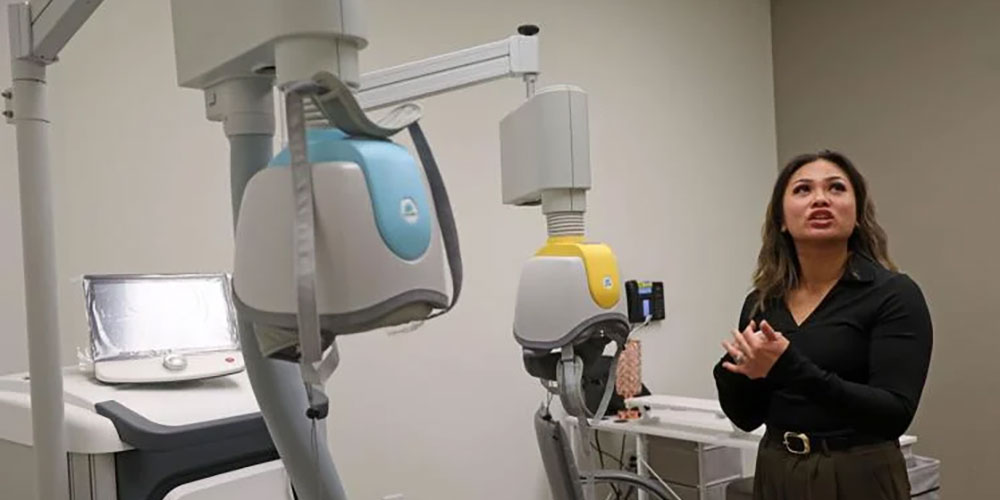Travis Towns, a 37-year-old veteran stationed at Fort Bliss, has served all around the world during his 11 years in the military. While deployed in Eastern Europe in January 2024, Towns fell down a mountain and suffered a brain injury. “It’s really affected my vision, my sleep, my cognitive thinking and function,” said Towns, who is from Austin. After reaching out to a therapist, it was recommended he undergo deep TMS, or deep transcranial magnetic stimulation. Deep TMS is a treatment for major depressive disorder developed by global medical tech company Brains Way. The method was approved in 2013 by the U.S. Food and Drug Administration.
Major depressive disorder, or MDD, is also known as clinical depression, a mood disorder characterized by persistent sadness or loss of interest or pleasure in activities. Other symptoms include changes in sleep, appetite and energy levels. It affects how individuals feel, think and behave, and can significantly impact daily life. During DTMS treatment, Towns wears a helmet connected to a machine that delivers non-invasive brain stimulation therapy, a method of modulating brain activity using external techniques like magnetic fields or electrical currents. There’s no need to surgically implant devices or use sedation and anesthesia. This approach differs from invasive techniques like deep brain stimulation or electroconvulsive therapy, which both require more extensive procedures. The deep TMS machine uses magnetic pulses to target specific areas of the brain to treat mental health conditions. From the outside, it appears the headgear is vibrating on the person wearing it for a period of time. Towns has been undergoing treatment for five months at Katie’s Way Plus military mental health clinic in Northeast El Paso. He said the technology has helped him with his sleep and to control outbursts of anger and depression due to post-traumatic stress disorder.
“Once that magnetic pulse starts going through, it’s about every couple of seconds, it’s very targeted to where they see issues from the brain scans,” Towns said. “The first few times I had a little bit of headache, but I got used to it. It drowns out the constant ringing in my ears.”
Dr. Jason Wieman, president of strategic relations for Katie’s Way Plus, said the clinic began using this technology in 2023. Wieman, a retired U.S. Army colonel and family practice physician, said he is always looking for non-pharmaceutical methods to treat people’s health. “Medications and pharmaceuticals definitely have their purposes, but in my opinion, they are overused a little bit,” he said. “When the idea of deep transcranial magnetic stimulation was presented to me, that completely fell in line with my thoughts on health care.” According to the National Institutes of Health, deep TMS has a response rate of 70% after 20 treatment sessions and 80% after 30 sessions.Wieman said Katie’s Way Plus has a commitment of 36 sessions, which usually take about two months to finish. He added some patients request more or less appointments depending on how they feel. “Initial studies and FDA certification indicate 36 sessions being the sweet spot, but we do individualize the treatment,” he said. “The exciting thing is that a year after completing this treatment, between 60% and 80% of patients are still in remission, showing positive effects.” Across all 10 Katie’s Way Plus clinics in the United States, Wieman said they have about 100 patients being treated through deep TMS. Wieman did not disclose the cost of the machines. As of now, the treatment is only for service members and veterans, but he said Katie’s Way Plus is looking to make it available to the public in the future. Brandy Rangel, facility director for Katie’s Way Plus in El Paso, said the clinic has 10 clients receiving deep TMS treatment.
“The magnetic stimulation to the brain cures the neuroplasticity in the brain to help with depression, anxiety, OCD (obsessive-compulsive disorder), PTSD and even smoking addictions,” she said.
To do the treatment, Rangel said the clinic maps the brain to pinpoint where to send magnetic pulses.
One session typically lasts 15 to 20 minutes. She said clients will ideally receive treatment three to five times a week. “What we’re trying to do is rewire your brain and heal your brain at the same time,” she said. Kristina Quinones, military practice liaison at Katie’s Way Plus, said deep TMS serves as an alternative when therapy or medications do not work. Quinones, who has served in the military for five and a half years, said her experience helps her relate to the active duty and veteran service members she meets. She said it becomes a great opportunity to showcase the treatment to them. “We’re told in the military that you have to be strong or push through your mental health issues, but you’re strong enough if you are willing to seek care,” she said. As Travis Towns continues his treatment of deep TMS, he hopes others seek similar mental health care, not just for them but for their loved ones. “I really wanted to get help for myself so that I can go back to my family and be better for them,” he said. “A lot of veterans have this macho way of thinking, to not show pain or weakness, forget that. If you need help, get it.”







